Welcome to AsterGardening, the best place for green thumb plant lovers to be. In this guide, we’ll discuss soil ph for tomatoes. We guide you on how to grow fresher, healthier and juicier tomatoes.
Don’t worry if you’re having problems when growing tomatoes. We have tips and tricks from years of experience. We master soil and environmental conditions.
We don’t want you to make the same mistakes and get irritated when your tomato fruit doesn’t deliver. After implementing this guide, your tomato plants will look better than ever!
Buckle up! Let’s grow tomatoes!
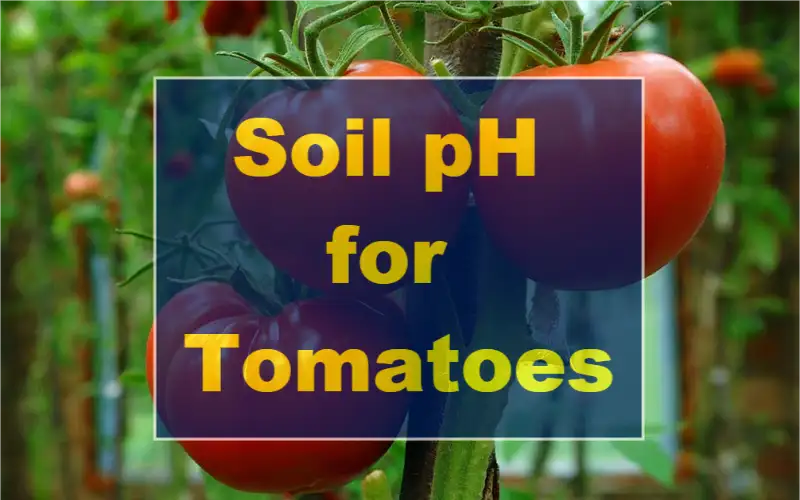
Why Does Soil pH Important for Tomatoes?
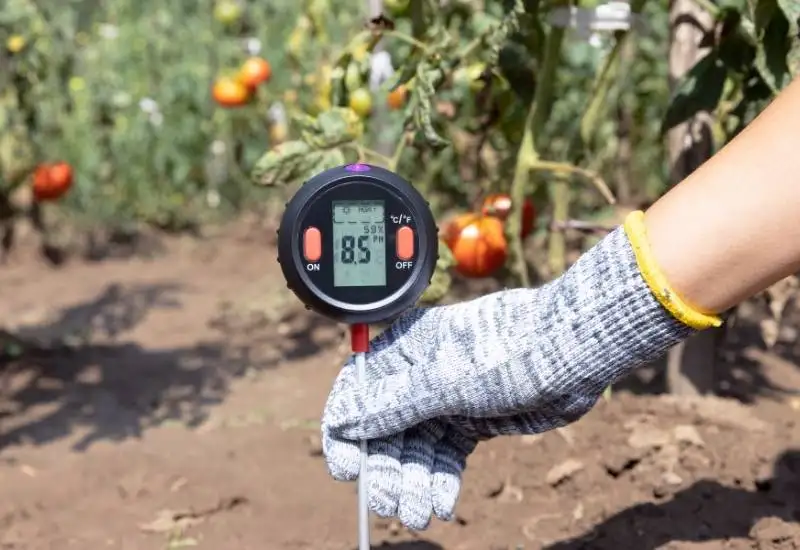
When it comes to tomatoes, they have a bit of a “sour” attitude toward the soil’s pH level. It’s true! It’s a make-or-break situation for them regarding soil ph levels. If you mess these up, it might look like you’ve grown your tomatoes on Mars!
If the soil is too acidic or alkaline, it can significantly affect your tomato plants. It makes sense. The plant gets all its nutrients from the soil. They need to have just the right conditions for HEALTHY and fruity GROWTH!
Here are a few reasons why soil pH is essential for tomatoes:
Nutrient Absorption
Every plant has its specificities. Meeting exact conditions means cultivating the ground to provide them with valuable nutrients. How? Well, they need specific conditions for nutrient absorption.
Tomatoes need nutrients like nitrogen, phosphorus, and potassium. Tomatoes thrive in these nutrients and grow BIG and STRONG. The pH level aids them in absorbing these nutrients.
Too much acidic or alkaline soil affects the availability of these nutrients. This affects the nutrient levels. In the end, you’re left with stunted tomatoes, which aren’t tasty. No one wants nutrient deficiencies!
Disease Resistance
Don’t you cringe every time you hear the word disease? It’s the enemy of your plants, and plant lovers HATE it. Well, understand why you need to take care of this properly.
Soil pH is vital in how susceptible your plants are to diseases. Tomatoes are prone to soil-borne diseases like blight and root rot. E.g., blossom end rot. The plant is more vulnerable to disease if the soil is too acidic.
Overall health
Just like humans, balanced pH values are necessary for tomato plants. Soil ph levels affect the overall health of the plant. Wrong pH levels can hamper root growth, leaf development, and fruit production.
Do you see why your garden soil needs the proper ph and nutrient levels? Your Tomato plants deserve the RIGHT conditions!
How Does Soil pH Influence Tomato Plant Growth?
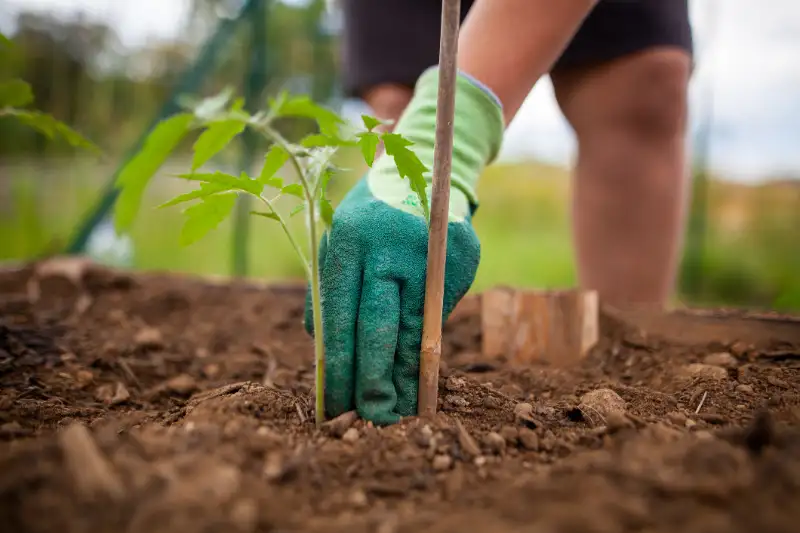
Everything on this planet has a specific growing condition. Plants feel COMFORTABLE and THRIVE in the correct soil pH. This can make all the difference between a healthy, robust plant and a struggling unhealthy one.
How though? How does the soil pH affect soil particles? That is the question. In ways you can’t IMAGINE. That is the simple answer.
Nutrient Intake
Nutrient uptake is NECESSARY for plants. Here are some nutrient-related items that get affected due to the wrong pH.
Acidic Soil
- Acidic soil limits the availability of essential nutrients like calcium, phosphorus, and magnesium.
- Unavailability of nutrients cause the plant to produce fewer and smaller fruits
Alkaline Soil
- A high soil pH (alkaline) leads to a deficiency in other nutrients like iron and manganese.
- This causes stunted growth and yellowing of leaves.
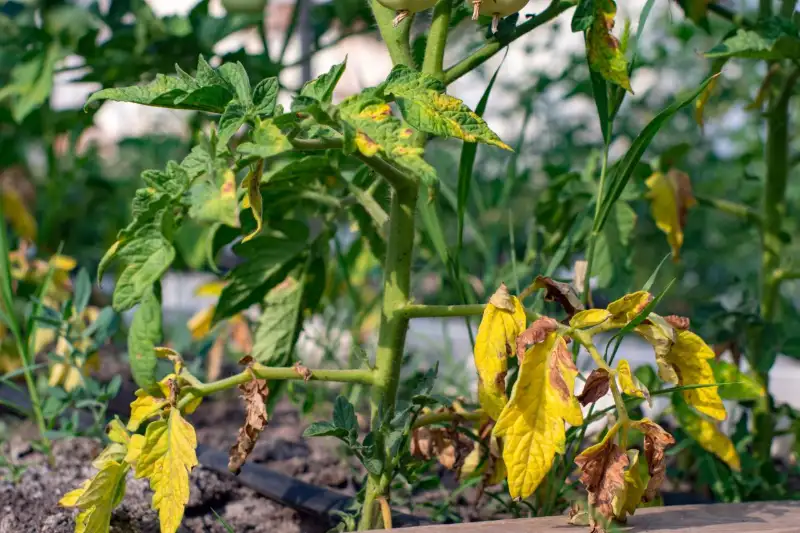
Microorganisms
You don’t think about them much, but they are there! Microorganisms live in the soil. Some beneficial ones, like bacteria and fungi, are vital to plant growth.
They help break down organic matter, which then converts into nitrogen. Plants use this nitrogen, and it safeguards the plants from diseases.
The wrong soil pH hinders the activity of the microorganisms.
Fruit Quality
Tomatoes grow tastier when the pH of the soil is managed correctly. High ph or very low pH levels could spoil the quality of your crop. No one wants small or mealy tomatoes! To grow a HEALTHY and JUICY fruit, you must manage the tomato’s ph level.
Now, do you realize how vital a soil’s ph levels are? There’s more to a plant than what meets the eye. The kitchen is underneath the ground, and you need to ensure that the kitchen’s ph levels are ideal.
What is the Ideal Soil pH For Tomatoes Growth?
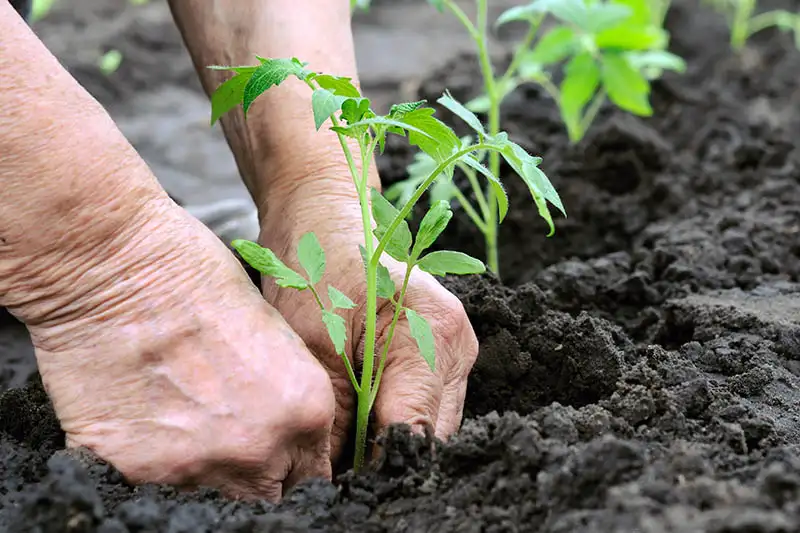
Let’s talk about a utopian world where the soil pH is EXACTLY what your tomato plant needs. Ideally, the pH level should range from 6.5 to 6.8 throughout the growth period. Now that’s something very specific.
This range entails tomatoes enjoying slightly acidic soil, seven being neutral.
Now you know how critical this matter is, so best to get your soil tested. Make any changes to the soil solution before you plant your tomatoes. During their growth period, of course, you’ll have to monitor them like a BABY!
An optimal range will ENSURE that your tomatoes grow and produce a bountiful harvest. Here are two ways for soil testing:
pH Test kit: Get this because you’ll need it a lot. The modern tester can easily point out the soil acidity or pH levels, and you can then modify and have the right soil acidity.
Nursery: If you don’t want to get a kit and have a convenient nursery nearby, they can do a soil test for you. Take a soil sample with you, and they’ll tell you the soil’s pH level.
Remember, it’s all about the soil. So make sure you are catering to other requirements like draining and soil texture as well.
How to Adjust Soil pH For Growing Tomatoes?
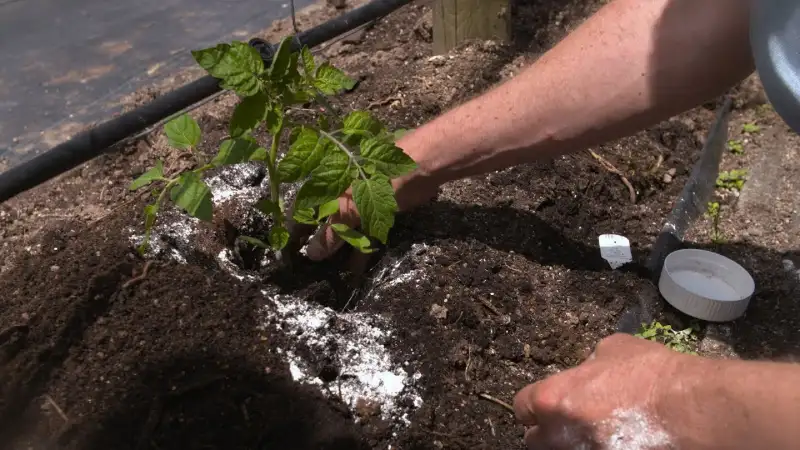
There are a few ways you can adjust your soil pH. Your tomatoes are growing, and obviously, you can’t uproot the soil right now; it’s too late. They’ve gotten their roots in the ground, but the ph scale has told you that the soil’s ph levels aren’t healthy.
Fear not, fellow green thumb! Just keep reading, and you can adjust your soil’s pH. Your tomato plants deserve the love they need to GROW BIG and STRONG.
Let’s go through some ways to adjust soil pH for growing tomatoes:
Test the Soil
Don’t get HASTY. Remember that this is a process. First, you’ll need to test your soil to know precisely where the pH levels are currently. There are different remedies for soil that is too acidic and different for soil that is too alkaline. Let’s walk through both situations.
Lime
Lime is a neutralizer that will help balance out the acidity of your soil. Lime is a natural product, so don’t worry about being cruel to the environment. Dolomitic lime is the best way to go about increasing pH levels.
Dolomitic lime contains magnesium as well as calcium, both alkaline materials. What’s better is that magnesium is an essential nutrient in plant growth.
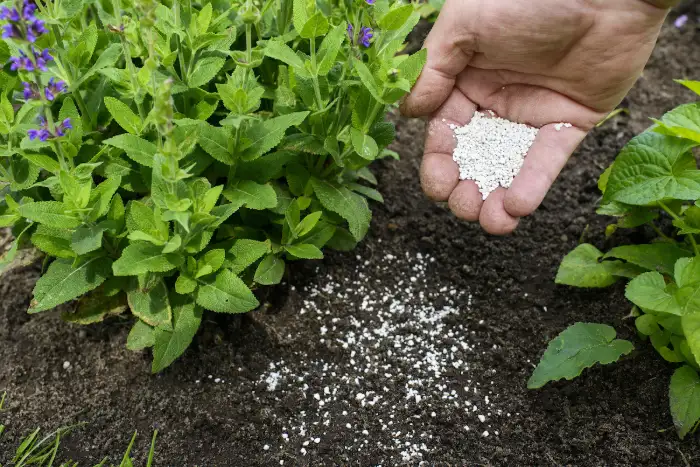
You can also try adding limestone if you don’t have dolomitic lime available. Or, for that matter, you add calcium, too, so the pH rises. Both of these are very renowned neutralizers.
Sulfur
If the test results are high, you’ve got an alkaline situation. Elemental sulfur is a natural product that can be applied to the soil or mix it before adding compost to your soil. BE SURE not to add too much sulfur, or your plants might burn if you acidify the soil.
Organic Matter
An easier way to balance soil pH is by mixing organic material into your soil. Let the mix of things take their course into fixing your soil’s pH. Add compost, manure, or shredded leaves, which positively impact your soil pH.
Another organic matter you can include is:
- Wood ashes
- Bone meal
- Pine needles
- Wood ash
- Peat moss
Water with Vinegar
This is a quick-fix solution for alkaline soil. You can lower the soil pH if you try watering your tomato plants with vinegar and water. The proportion is one tablespoon of vinegar and one gallon of water. Vinegar is a strong acid, so you need to dilute it.
Pro Tip: Sometimes, the pH level doesn’t have a problem, but you still need to add some nutrients to the soil. Adding calcium sulfate is a safe option. It provides nutrients and doesn’t mess with the pH levels of your soil.
Adjusting soil pH is a gradual process. Have some patience when trying to change the pH conditions. Just do your best, and keep testing the soil regularly. With some love and attention, your tomato plants will thrive in no time!
Requirement of Soil pH for Tomatoes
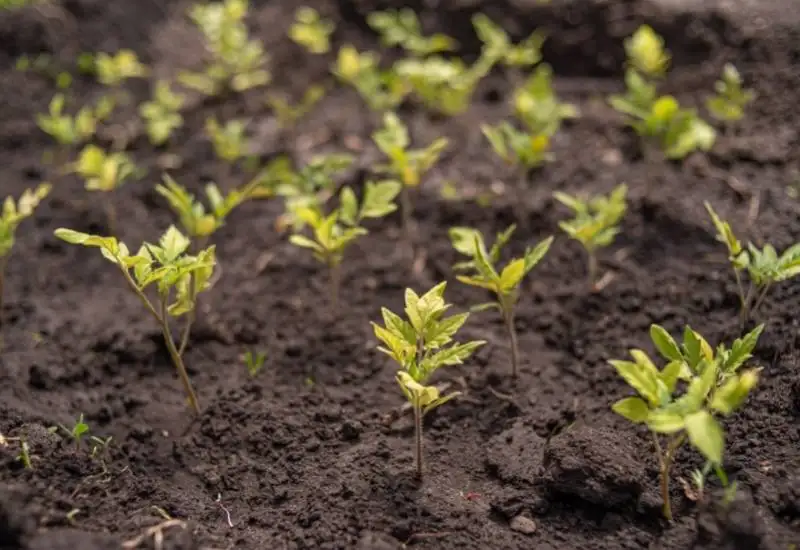
If you treat your plants like your baby, they don’t seem to be a bother. By now, it does seem like you have a baby monitor right next to them. It’s like you JUMP whenever the pH goes up, and you try to acidify soil. Well, that’s how it should be as well.
Keep the pH levels hovering around 6.0 to 6.8, and you should be ready. Knowing what kind of interactions your plants may have with soil that’s extremely acidic or too alkaline is important.
A higher pH hinders the ability of your plant to take up nutrients. This leads to slower growth, and you don’t want that!
One solution for that is sphagnum peat moss. This helps improve the pH level by bringing it down and helps in water retention. Want those PLUMPY tomatoes? Well, this is it.
A lower pH leads to deficiencies in calcium and magnesium intake. This causes leaves to be yellow, making the overall plant look sad!
Give PROPER care and attention to nutrient intake, and you’ll figure out the soil. You’ll become an expert on acidic soils after getting into practice!
FAQs about Soil pH for Tomatoes
1. Are coffee grounds good for tomato plants?
Coffee grounds are FANTASTIC for tomatoes. They make the soil slightly acidic, and we know how much our tomatoes like acidic soil. But don’t get over-generous and add too much, be calm and patient with your plant’s soil.
2. What is the best fertilizer to use on tomatoes?
Always look for a balanced fertilizer when you opt for a fertilizer. That’s the safest option. A fertilizer with an NPK ratio of 5-10-10 could become your all-time favorite.
If you’re looking for organic options, you can always add wood ash, peat moss, and other organic materials.
3. What is the fastest way to lower pH in soil?
If you’ve felt the pH go too high, don’t panic! Adding sulfur is the fastest way to lower the soil pH. But be cautious, you don’t want them to burn by putting in too much!
What’s Next
Now you’ve seen how pH affects a plant’s life. It’s only natural for a plant to feel this way. They want their conditions.
Just like humans have, theirs and every living organism have theirs. Tomatoes grow best in specific pH levels, and now you’ll see the difference in your plants!
Like tomatoes, most plants have a specific pH level condition that you should look out for. We’re sure this was helpful right? Go ahead and share this valuable information with your friends!
Astergardening has tips and tricks to set your plants apart from anyone else!
